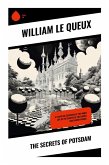Set against the vibrant backdrop of British India, Rudyard Kipling's "Kim" is a masterful blend of adventure, historical fiction, and spiritual discovery. The narrative follows the journey of Kimball O'Hara, an orphaned son of an Irish soldier, who becomes embroiled in the Great Game-a political rivalry between British and Russian interests in Central Asia. Kipling's prose is rich and evocative, characterized by its intricate tapestry of Indian culture, languages, and landscapes, offering keen insights into the complexities of colonialism and identity. The novel not only provides a thrilling plot but also serves as a poignant exploration of loyalty and self-discovery amid the political machinations of the era. Rudyard Kipling, a key figure in colonial literature, drew upon his own experiences in India-where he was born and raised-for many of his works. His deep appreciation for the diverse cultures and peoples of the subcontinent informed the vivid characterizations and settings in "Kim." Kipling's broader literary oeuvre often grapples with themes of imperialism and the tensions between tradition and modernity, reflecting the multifaceted nature of colonial life. For readers seeking an engaging and thought-provoking read, "Kim" stands as a timeless exploration of adventure and identity within the rich tapestry of colonial India. Kipling's intricate narrative invites readers to reflect on the complexity of cultural encounters, making it an essential read for those interested in the intersections of adventure, history, and identity.
Bitte wählen Sie Ihr Anliegen aus.
Rechnungen
Retourenschein anfordern
Bestellstatus
Storno








